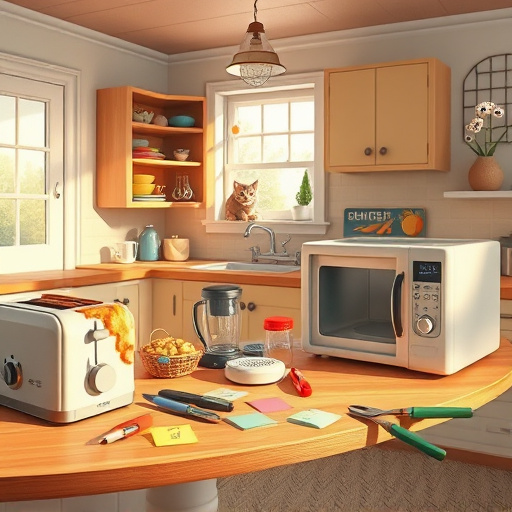
How to Repair Damaged Kitchen Appliances: Step-by-Step Guide
Unlock Your Culinary Powers: How to Repair Damaged Kitchen Appliances Like a Pro!
Your kitchen is the heart of your home—the place where culinary magic happens, family gathers, and memories are made. But when essential appliances break down or malfunction, it can throw your entire routine into disarray. Learning how to repair damaged kitchen appliances not only saves you money but also gives you the satisfaction of tackling problems head-on. Let’s explore reliable, professional strategies to bring your appliances back to life and restore your kitchen’s full potential.
Why Is It Important to Know How to Repair Damaged Kitchen Appliances?
Many homeowners overlook the significance of understanding basic appliance repair. However, knowing how to fix damaged kitchen appliances provides several benefits:
- Cost Savings: Avoid expensive service calls and extend the lifespan of your appliances.
- Saves Time: Quick fixes prevent delays in meal preparation and daily routines.
- Empowerment: Gain confidence in handling maintenance and minor repairs yourself.
- Prevents Further Damage: Early intervention stops small issues from escalating into costly problems.
What Are Common Signs That Your Kitchen Appliances Need Repairs?
If your fridge is making strange noises, not cooling properly, or leaking water, these are signs it's time to investigate. Efficient cooling is vital to keep your food fresh and safe. Ignoring these symptoms can lead to spoiled groceries and higher energy bills.
Leaks, failure to drain, or strange odors are common signs. A malfunctioning dishwasher not only hampers your cleaning routine but can also cause water damage if left unaddressed.
Uneven heating, failure to turn on, or strange electrical smells point to potential issues. A reliable oven is essential for consistent cooking results, so troubleshooting quickly can save your dinner plans.
Step-by-Step Guide to Repair Damaged Kitchen Appliances
Embarking on a repair journey requires a systematic approach. Here’s a comprehensive step-by-step guide to help you navigate common appliance issues with confidence:
1. Safety First: Before Starting Any Repair
Always unplug appliances before working on them. Use gloves and safety glasses if needed, and ensure your workspace is clear. Remember, safety is paramount when tackling electrical or mechanical repairs.
2. Diagnose the Problem Accurately
Understanding the root cause is key to an effective repair. Use the appliance's manual, observe symptoms, and perform basic tests. For example, if your refrigerator isn’t cooling, check the condenser coils, door seals, and temperature control settings.
3. Gather the Right Tools and Replacement Parts
Keep a toolkit with screwdrivers, pliers, a multimeter, and other essentials handy. Identifying and sourcing quality replacement parts ensures longevity for your repair work. For those unsure about parts, consult a professional or reputable supplier.
4. Follow Detailed Repair Procedures
Consult manufacturer guides or trusted online tutorials. Keep track of all screws and components as you disassemble. For instance, replacing a faulty thermostat in your fridge can restore proper cooling if you carefully follow step-by-step instructions.
5. Test Your Repairs
After reassembly, plug in the appliance and run tests. Observe its operation for a few cycles to confirm the issue is resolved. If problems persist, revisit the diagnosis or seek professional assistance.
How Can Professional Services Enhance Your Repair Efforts?
While DIY repairs are rewarding, some problems require expert intervention. For complex issues such as kitchen renovation experts or intricate electrical work, hiring professionals ensures safety and guarantees quality outcomes. Professionals also have access to specialized tools and genuine parts that extend the lifespan of your appliances.
Are There Preventative Measures to Minimize Appliance Damage?
Preventing damage is always preferable to repair. Follow these simple tips to prolong your appliances’ life:
- Regularly clean filters and coils to improve efficiency.
- Avoid overloading your washer, dryer, and dishwasher.
- Use appliances according to manufacturer instructions.
- Schedule routine maintenance checks with professionals.
- Address small issues immediately to prevent escalation.
What Are the Benefits of Upgrading Your Kitchen During Repairs?
Sometimes, repairing alone isn’t enough—upgrading appliances or kitchen features can significantly boost functionality and aesthetics. A cost-effective kitchen remodel can improve your cooking experience and increase home value. Consider replacing outdated appliances with energy-efficient models to save on bills and reduce your carbon footprint.
How to Plan Your Kitchen Repair and Renovation Timeline
Timing is critical for a smooth upgrade or repair process. For example, the best time of year for kitchen renovations varies, but planning ahead ensures minimal disruption. Coordinate repairs with renovation projects for a cohesive transformation, especially before hosting events like Easter brunch or family gatherings.
FAQs: Your Guide to Mastering Kitchen Appliance Repairs
Yes, for basic repairs like replacing filters or knobs. However, for electrical or complex mechanical problems, consulting a professional is advised to ensure safety and proper functionality.
A basic toolkit should include screwdrivers, pliers, a multimeter, a wrench set, and safety gloves. For specific repairs, additional specialized tools may be required.
It varies depending on the issue’s complexity. Simple fixes can take less than an hour, while more involved repairs might require a few hours or even a professional visit.
If you’re unsure about electrical components, the appliance is under warranty, or if the repair involves major parts, it’s best to hire qualified technicians to avoid risks and ensure quality work.
Ready to Transform Your Kitchen and Master Appliance Repairs?
Now that you understand how to repair damaged kitchen appliances, it’s time to take action. Whether fixing a simple fault or planning a larger renovation, applying these tips will enhance your kitchen’s efficiency and aesthetic appeal. Remember, a well-maintained kitchen not only makes daily cooking more enjoyable but also adds lasting value to your home.
For expert advice and professional help on DIY repairs or to explore extensive kitchen upgrades, reach out to Talisman Renovation & Design. We’re committed to turning your culinary space into a powerhouse of creativity and comfort.

















